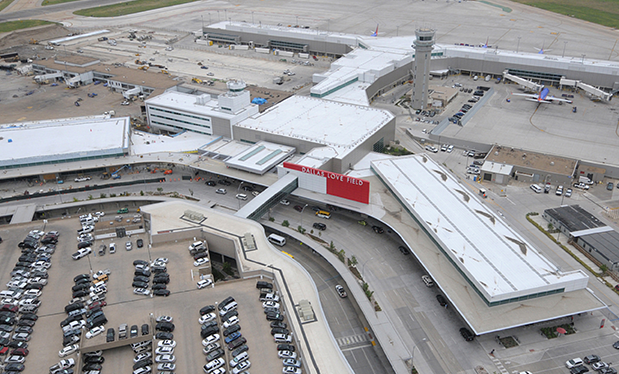As the demand for greater efficiencies in your company's operations increases, technology becomes a key component of doing business. Technology comes in many shapes and sizes, and leading roofing contractors are realizing if they are not progressive in their use of technology, they are going to be left behind.
Technology is not just software; it is using services and cloud-based solutions to help increase productivity for a company and its employees. Exploring multiple types of technologies and evaluating their effectiveness for your company—no matter the size or type—can play an important part in your company's continued growth.
New technologies and applications constantly are being introduced, and understanding what can benefit your roofing contracting business is critical for success. Following are a few important sales and marketing technologies that can make a difference in growing your sales and profitability in 2017.
Websites
The most important marketing technology is a quality website. Your website needs to provide enough information about your company so potential customers will request estimates and/or additional information for projects. A customer wants to feel confident in your company's experience and professionalism. A website can help validate your company's expertise, long-term service and excellent responsiveness along with strong knowledge of the latest products and technologies, and customers will be enticed to respond. The quality of information will speak to customers long before they pick up the phone.
A website should be dynamic, meaning the content should be fresh and always up-to-date. It should feature a section or blog that provides short articles and information customers will find interesting. Press releases and other news also should be shared regularly on the site. A good website will have a prominent button or link on every page for a visitor to click to request an estimate. Ask potential clients to complete a brief form that captures their contact information (name, address, phone number and email address) and gathers some basic information, such as budget, time frame for work completion, etc.
Finding a good website developer can be challenging, but there are several options. Everything from do-it-yourself to leasing a website to finding a knowledgeable marketing agency are possibilities. Before hiring a company to update or develop your website, look internally first. You may already employ people who can create websites or work on marketing projects. Also, take the time to look at other websites and note what you find impressive. Often, the name of the company that developed the site is noted at the bottom of the home page. Pulling information together ahead of meeting with developers will save time and money.
Smart devices
It does not seem possible to survive without a smart device and this especially is true when it comes to business. Smartphones and tablets allow contractors to be in touch immediately with their customers, giving those contractors the edge when it comes to customer service.
It is important to use phones in a way that works with customers, so knowing their preferences concerning email, text and/or phone usage is beneficial for creating enhanced communications. As part of the sales process, ask how a customer would prefer to receive project communications. A critical part of using technology is understanding how customers want to interact with the technology.
Smartphones and tablets make conducting business easier on the road, eliminating some late-night work. Asking vendors, such as manufacturers and distributors, about their technology offerings and finding out which apps make working with them easier helps both businesses. Being able to order materials, reports and/or services through a phone or tablet can lead to efficiency and time savings.
When deciding which smart device to use, take the time to coordinate your company's phones, tablets and computer system with cloud-based software so all devices can speak to each other. This creates an easy, efficient means of transferring data and documents while also documenting customer discussions.
Customer relationship management
There are several customer relationship management (CRM) systems designed for roofing professionals. CRM systems have evolved significantly over the years from server-based systems such as ACT to simple contact management solutions such as Microsoft Outlook or Excel to cloud-based, enterprise-level software similar to Salesforce. In the roofing world, there are many CRM software systems that help manage customers. Also, they often are connected to project management and/or accounting software.
Questions to ask when looking for a CRM system include how the program works for a residential versus commercial business. Ideally, it will handle both. There are companies that are focused on residential projects with functionalities that track canvassing, sales and overall leads. Commercial roofing software may focus more on inspections, service and maintenance and may feature a customer portal that allows property owners to access service records and request maintenance online.
Depending on a roofing contracting company's business model, the CRM system needs to fit the business. As roofing contracting companies continue to grow and gain sophistication, an important element for any CRM system is the ability to track customers' overall data and retain that data for long-term use.
No matter which CRM system you choose, the key is to maintain a strong, up-to-date customer database that not only provides a historical view of customers and projects but also is a strong database for future sales and marketing. By using CRM software instead of an Excel document, customer contacts can be automated and shared, including notes, past correspondence, property data, material preferences and/or potential future projects.
Social media
One popular technology tool for communications is social media. Different social media works best for specific audiences. Facebook has a stronger following among homeowners while LinkedIn is preferred by businesses. Remembering a building owner most likely also is a homeowner creates dual opportunities for exposure.
There are cloud-based software systems available, such as Hootsuite, where all social media can be controlled from one dashboard. This type of automation is being used by businesses, nonprofit organizations and large enterprises to manage messaging and timing. Time management is important when managing social media. With one dashboard, multiple social media platforms can receive company messaging, reducing the time it would take to update each platform separately.
Marketing automation
There are many buzzwords in marketing, and among the most popular are "marketing automation." The online publication Marketing Automation Times states marketing automation is a subset of CRM that focuses on the definition, scheduling, segmentation and tracking of marketing campaigns. The use of marketing automation makes processes that would otherwise have been performed manually much more efficient and makes new processes possible.
That definition is fairly broad. Yes, it is about automating processes such as email, blogs and web tracking, but it also is about building relationships with customers and potential customers that change the dynamic from chasing leads to attracting leads.
For roofing contractors, there is an ongoing need to attract and sustain customers over long periods of time. Whether they are homeowners or building owners, customers need to be nurtured to keep your company top of mind when roofing needs or referral opportunities arise. You need to maintain a strong, up-to-date list of customers through software automation. Without it, contact information, including emails that are sitting in folders and not entered into an up-to-date CRM system, is useless.
Once a CRM system is in place and information has been loaded, it is time to begin thinking about marketing automation. What needs to be communicated to customers? What are your company's customer profiles? If residential and commercial services are provided, it is important to segment the customers.
For example, a commercial-oriented email newsletter may need to be sent to building owners, but it most likely will be wasted on homeowners. It could even be considered spam by homeowners, hurting communication efforts. When reviewing your communications plan, make sure your company is sharing information customers care about.
Marketing automation software
Online companies such as HubSpot, Marketo and Act-On are just a few of the companies that offer a full software solution for tracking activity on websites, sending emails and linking activity with social media. When looking at this type of technology, be sure your company is ready for new processes and increased lead generation. There is a learning curve to connecting a CRM system to a marketing automation system and understanding how to correlate the content being sent through email, social media and/or a website to sales efforts. Leads will increase with this type of marketing, so it is important to put time and resources in place to handle the return.
There are agencies that offer marketing automation services. Again, make time to vet their services and ensure they understand your roofing business. Often, marketing organizations do not understand the difference between marketing to homeowners and building owners or residential and commercial clients.
Marketing automation is just one part of building good relationships through sales and marketing. Some companies have allowed technology to swing the pendulum too far away from personal relationships. Marketing electronically is about staying top of mind, but it is only a small part of building strong, trusting relationships with customers. Combining electronic communication with person-to-person communication can create exceptional customer satisfaction, referrals and highly sustainable business for your company. Using marketing automation as one of the tools in your marketing program and linking it to your company's overall goals and strategies is the winning combination.
Customer portals
For current customers, it is important to continually delight them by creating exceptional customer experiences. Leading contractors are using CRM software that offers customer portals where contractors can share data, photos, job progress, inspections and invoices with customers. This type of CRM software can be used for initial customer contact and sales along with the ability to track customers over time while storing all projects and related data.
Customer portals create an excellent user experience for customers. Innovative, web-based software systems are using relational database programs to efficiently help contractors manage project data, work order/invoicing processes, customer communication and document storage.
Many facility managers are asking for this type of communication. Maintenance portals play a significant role for facility managers, allowing them to see exactly what is happening with their roof systems. Understanding few facility managers will have the opportunity to walk on all their roofs, portals can inspire confidence through ongoing communications, documentation and visual review. Data storage and the ability to upload unlimited photos and video to the portal is essential to providing real-time documentation for customers.
Facility managers also can report a service request through portals and track the status of the work. Email alerts can help keep all parties aware of updates or repair requirements. As noted earlier, the future is in the speed of delivery using mobile solutions. Mobile devices on roofs provide expedited communication, the ability to send succinct inspection reports and easy service reporting when linked with the right CRM system.
By using custom inspection checklists, roof service teams can quickly communicate roof issues or concerns along with the work progress. Custom inspection reports include photos from the roof that correlate with early imagery or even satellite imagery to create a visual timeline for the facility manager. All this is shared through the online portal, providing an easy way to distribute information to management, purchasing agents and/or building supervisors. It creates an ongoing customer experience that leads to referrals and long-term relationships.
There is an opportunity for residential contractors to offer the same portals to homeowners. By making repair information available 24/7 to homeowners, they can stay in contact with contractors and their home improvements. Implementing technology that retains all data on a property over time provides an excellent means of retaining homeowner business with ongoing repairs, yearly inspections and potential upgrades.
Take the time
The most important part of incorporating any technology into your company is to take the time to evaluate it. Talk to other contractors through roofing associations or networks and see what has worked for them. Look at online reviews and use free trials to try out and understand the technology. There is a large time commitment whenever there is a change or adoption of new technology, so be sure it matches your company's goals.
Also, be aware many types of software adoption will have a cultural effect on your company. You may need to update processes, train personnel and upload data. It is not easy to change software, so create a relationship with the software provider upfront and develop a high degree of comfort and confidence when initiating the new technology and processes with employees.
In the end, it is worth the time to find the right technology and systems to grow your company and improve productivity and profitability.
Heidi J. Ellsworth is owner of HJE Consulting Group, Camp Sherman, Ore.



